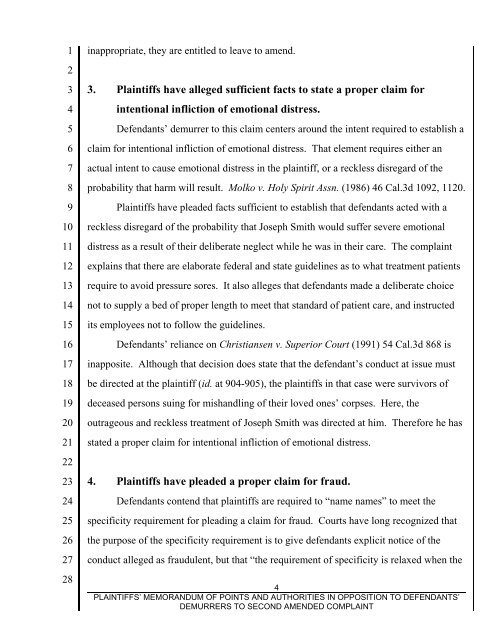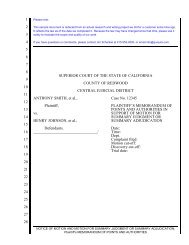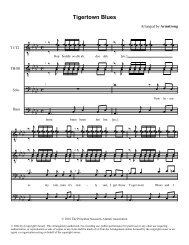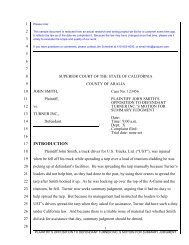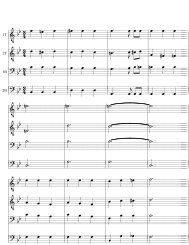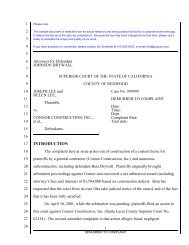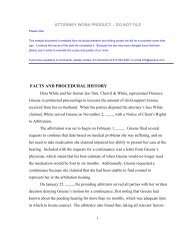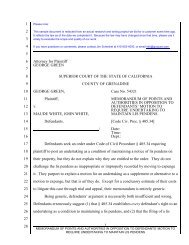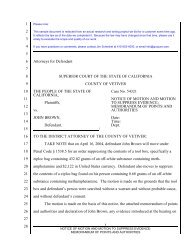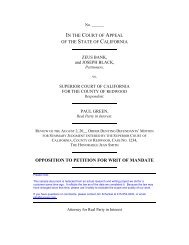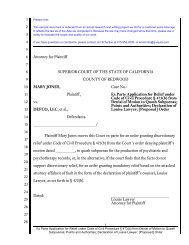Opposition to Demurrer - Quo Jure Corporation
Opposition to Demurrer - Quo Jure Corporation
Opposition to Demurrer - Quo Jure Corporation
Create successful ePaper yourself
Turn your PDF publications into a flip-book with our unique Google optimized e-Paper software.
1<br />
2<br />
3<br />
4<br />
5<br />
6<br />
7<br />
8<br />
9<br />
10<br />
11<br />
12<br />
13<br />
14<br />
15<br />
16<br />
17<br />
18<br />
19<br />
20<br />
21<br />
22<br />
23<br />
24<br />
25<br />
26<br />
27<br />
28<br />
inappropriate, they are entitled <strong>to</strong> leave <strong>to</strong> amend.<br />
3. Plaintiffs have alleged sufficient facts <strong>to</strong> state a proper claim for<br />
intentional infliction of emotional distress.<br />
Defendants’ demurrer <strong>to</strong> this claim centers around the intent required <strong>to</strong> establish a<br />
claim for intentional infliction of emotional distress. That element requires either an<br />
actual intent <strong>to</strong> cause emotional distress in the plaintiff, or a reckless disregard of the<br />
probability that harm will result. Molko v. Holy Spirit Assn. (1986) 46 Cal.3d 1092, 1120.<br />
Plaintiffs have pleaded facts sufficient <strong>to</strong> establish that defendants acted with a<br />
reckless disregard of the probability that Joseph Smith would suffer severe emotional<br />
distress as a result of their deliberate neglect while he was in their care. The complaint<br />
explains that there are elaborate federal and state guidelines as <strong>to</strong> what treatment patients<br />
require <strong>to</strong> avoid pressure sores. It also alleges that defendants made a deliberate choice<br />
not <strong>to</strong> supply a bed of proper length <strong>to</strong> meet that standard of patient care, and instructed<br />
its employees not <strong>to</strong> follow the guidelines.<br />
Defendants’ reliance on Christiansen v. Superior Court (1991) 54 Cal.3d 868 is<br />
inapposite. Although that decision does state that the defendant’s conduct at issue must<br />
be directed at the plaintiff (id. at 904-905), the plaintiffs in that case were survivors of<br />
deceased persons suing for mishandling of their loved ones’ corpses. Here, the<br />
outrageous and reckless treatment of Joseph Smith was directed at him. Therefore he has<br />
stated a proper claim for intentional infliction of emotional distress.<br />
4. Plaintiffs have pleaded a proper claim for fraud.<br />
Defendants contend that plaintiffs are required <strong>to</strong> “name names” <strong>to</strong> meet the<br />
specificity requirement for pleading a claim for fraud. Courts have long recognized that<br />
the purpose of the specificity requirement is <strong>to</strong> give defendants explicit notice of the<br />
conduct alleged as fraudulent, but that “the requirement of specificity is relaxed when the<br />
4<br />
PLAINTIFFS’ MEMORANDUM OF POINTS AND AUTHORITIES IN OPPOSITION TO DEFENDANTS’<br />
DEMURRERS TO SECOND AMENDED COMPLAINT


